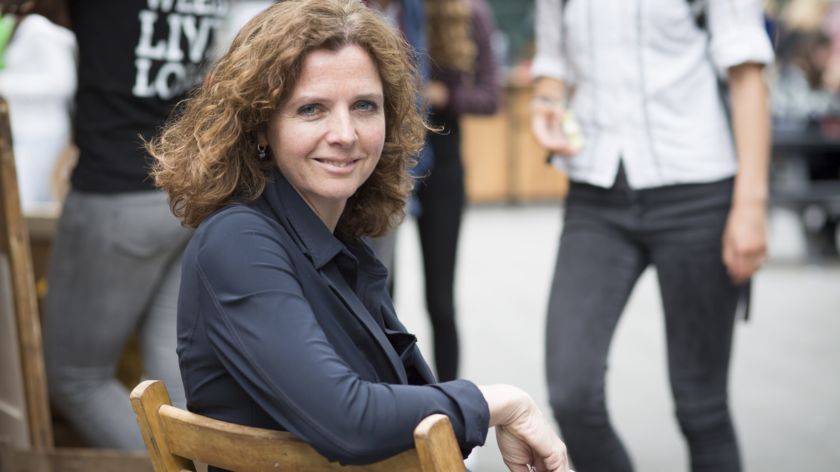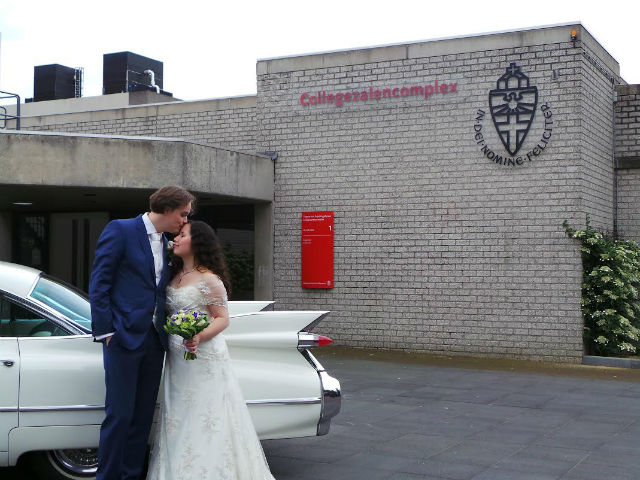‘Saying sorry helps’
-
 Foto: Erik van 't Hullenaar
Foto: Erik van 't Hullenaar
Partners who separate often go through difficult times, not to mention the impact on the children. People who are in good relationships tend to be healthier and happier. But what makes a good relationship? This is what psychologist Esther Kluwer, professor by special appointment in Nijmegen, wants to investigate.
People are constantly asking her: ‘What is the secret of a good relationship?’ This question sometimes takes the form of a desperate e-mail listing the person’s marriage difficulties. But Esther Kluwer (48) does not rise to the bait. She is not an ‘Ask Professor Kluwer’ type, and has no intention of running a letter column in a women’s magazine. In her modest office in the Uithof in Utrecht, the equally modest psychologist explains what she is: a researcher. And it is in this role that she hopes to uncover the secret of lasting love between two people. As a professor by special appointment in Nijmegen she studies ‘long-lasting relationships and well-being’.
The Chair is endowed by the Marriage Week Association. This Christian association aims to promote people staying together – they organise initiatives such as the annual ‘relationship week’ and offer advice for keeping love alive. Is your research intended to turn the tide on the growing number of divorces?
‘After my appointment, newspapers published articles with titles such as ‘Professor saves relationships’. Obviously, I can do no such thing. What I can do, however, is draw people’s attention to this theme. The idea for this Chair arose at an expert meeting in Parliament a few years ago, at which the Marriage Week Association was also present. We were talking about relation therapy no longer being reimbursed, and what consequences this would have. One of the recommendations was to conduct more research on what makes people stay together.’
Esther Kluwer (Colmschate, 1968) studied Psychology in Groningen. She is an Associate Professor at Utrecht University. She previously studied the impact of a first child on a relationship, forgiveness in relationships, and the effect of mediation on conflict-laden divorces. As a professor by special appointment on long-lasting relationships and well-being in Nijmegen (since 1 October), she will be collecting data on large groups of individuals in relationships. Esther Kluwer has been with her partner for 21 years and has three children.
Is this because the Church would prefer people to remain married?
‘No, my research is not normative. I am an independent researcher. I am not going to tell people, ‘You have to stay together!’ My interest is primarily scientific. But I also see the societal relevance of this theme. Divorce has an incredible impact on people and its effect spreads to other areas of life.’
Such as?
‘Health and well-being for example. Nobody separates for fun. Especially if children are involved, people want to raise them together. A divorce is stressful and has a negative impact on children; on their learning, their well-being, their behaviour. Research shows that children of divorced parents have a slightly higher chance of becoming involved in criminal activities, while the coaching of partners and children alone costs society an incredible amount of money.’
Approximately 40% of today’s marriages end in divorce. So, all those people are costing us a lot of money?
‘EconoVision Bureau in Rotterdam recently calculated that divorces cost society € 2.3 billion per year. This includes all kinds of costs you might never think of: social benefits, housing benefits for single-parent families, foregone tax income because the legal costs of divorce are tax deductible. Not to mention absenteeism. Most people really go through a rough patch, with some even becoming ill and staying at home. However, I am more concerned about the psychological consequences than the monetary aspect. In newspapers, you read a lot about conflict-laden divorces, which are terrible for children. And it’s not what the parents want either; they are just as sad about it.’
Is a bad marriage better than divorce?
‘No. Research shows that alcoholism, depression and eating disorders are more common among singles than people in a relationship. So, in principle, a relationship is good for your health. But this is only true if it is a good relationship. A bad relationship is just as negative as none at all, given that it causes a lot of stress. And stress has negative effects, for instance on your heart.’
Could you perhaps offer struggling partners a few words of advice? After all, we all want to be healthy and happy.
‘Well, it’s all about rather logical things really. Doing something for your partner from time to time is good for your relationship. Sacrifice – doing or not doing something because of your partner. Not going out one night because your partner wants to cuddle on the couch, or moving to X because your partner is offered a great job opportunity. Accommodation is a form of conflict resolution that I like. Imagine that your partner is shouting at you; your natural response might be to counter-attack or crawl into your shell. But you could also try to react more constructively. Research has shown that this has a positive effect.’
My partner comes home and sees that I did not wash the dishes. He explodes. I say: “Yes, but you did not hang up the wash.” Is that constructive?
‘No. No ‘yes, but…’! He may be in a bad mood because something happened at work. You could also try to remain calm and ask him ‘Did you have a bad day? Is there something I can do for you?’ Saying sorry often helps, even though many people find it difficult. You are bound to do things at times that bothers or hurts your partner and that is why a sincere apology often works wonders. It can help the other person shift into forgiveness mode.’
‘We are attracted to people who are like us’
Forgiveness does not always seem to be feasible. Imagine that instead of a pile of unwashed plates, what he discovers is a secret affair.
‘‘What you love most can hurt you most’. You have the power to hurt each other precisely because you are intimate with one another. Are there any tricks for forgiveness? It often helps if you understand the context. This makes it easier to see why the other person acted the way they did. Apologies help too. Your desire to stay together might motivate you to forgive. If you think: ‘I don’t believe in this relationship anyway’, then why should you forgive? It’s not a button that you can just turn on and off. Of course, you feel hurt, otherwise there would be nothing to forgive. And forgiveness is something that people need for themselves as well, because it makes them feel better. It helps to think: ‘I could stay mad forever, but I am the one who will suffer most from feeling resentful.’’
You might be willing to say “I forgive you”, but what if you don’t feel it?
‘We could have an entire interview just about this topic. In the end, you should move past the pain. Some people may never be able to forgive; it’s also a question of character. You bring all of yourself as well as your baggage to the relationship. The quality of your relationship is partially determined by how you function. How do you deal with conflicts? Are you capable of intimacy? Both psychological and sexual? Were you securely attached as a child?’
Many relationships begin on campus. How would you rate their chances of success?
‘People are attracted to people who resemble them; like attracts like. There is a lot of evidence that this is how it works. At university, you are surrounded by likeminded people, so chances are high that you will meet your partner at the sports association or in the lecture hall. But a lot changes after your studies: you might move or get a job. Distance makes it difficult to keep a relationship alive. And all these new experiences will also change you in various ways. I cannot offer any data to support this, but intuitively, I would say that your studies are not a period in which you are likely to meet your life partner. Once your life becomes calmer in terms of housing and work, you might enter a phase in which you seek more stability. It used to be different: you met someone, got married, and that was it.’
‘We get divorced more often because we set higher standards’
Why are so many people getting divorced nowadays?
‘Because we set higher standards than before. It used to be quite simple: you had to be a good housewife and mother or a good provider. Divorce was taboo. The social norms have changed tremendously, partially as a result of secularisation. Children of divorced parents are more likely to get divorced themselves. They have no example of how to stay together when things get rough. Divorce is much more accepted now, which also lowers the threshold. And women are often financially independent, so they don’t have to stay just to avoid ending up destitute. Nowadays a lot of young people want a brilliant career, good looks, and a fantastic relationship. But you can’t have it all. Sometimes things go wrong. What is important is how you deal with it. Research shows that people who have growth beliefs, who understand that a relationship can grow but that it costs time and effort, are better at dealing with relationship conflicts than people who think that everything should be perfect and will not settle for anything less than a prince on a white horse.’
Good thing that there are second and third marriages. An opportunity to do better, right?
‘If only that were true. But the divorce percentage in following marriages is even higher than in first marriages.’
How can that be? Don’t we learn from our mistakes?
‘People who were divorced once may find it more difficult to deal with conflicts. And they bring such characteristics to their next relationship. Also, second or third marriages often involve patchwork families. This only makes things more complicated. Plus, people can experience additional stress because their social circle is less accepting of their new marriage.’
How long should a relationship be to qualify as ‘long-lasting’ from your perspective?
‘There is no set limit. My research does not focus on the number of years. I want to study which factors determine the quality of relationships. My Chair’s description does not focus on the causes of divorce – so much research has already been done on that topic – but on investigating what keeps people together. I hope that this knowledge can help people. I want to take a positive approach to relationships.’
[kader-xl] Highly educated people in love
Highly educated people in love
A large-scale sociological study among the Dutch shows that highly educated people tend to enter relationships with other highly educated people. Eight percent of couples meet at school or university. The Internet is an important relationship market for people in their forties and divorcees. Of the couples who moved in together between 1998 and 2003, only 2% had met online. Ten years later, this figure had risen to 13%. Work is an even more important meeting place: 15% of couples meet there (Sources: Matthijs Kalmijn and Wilfred Uunk, “Educational homogamy in the Netherlands revisited”, and CBS). The odds of a relationship ending are higher among people from a lower social economic class than among people with a higher level of education and income. According to Esther Kluwer, this is due to pressures caused by problems such as unemployment and poverty. At the same time, chances of divorce increase as a woman earns more money and achieves a higher level of education. This makes it easier for her to leave. A relationship is most likely to remain stable if the man has achieved a high level of income and education. Kluwer: “Women find status more important in their choice of partners than men. One explanation for this is evolutionary: Women invest a lot of energy in children, so they look for a man who can support their offspring.”[/kader-xl]
This article appeared in Vox 3



